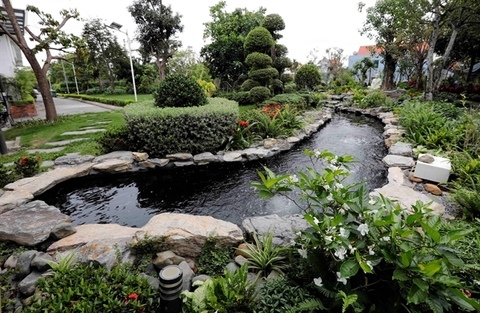|
Eco-industrial park development targets net zero emissions
The development of eco-industrial parks is considered an effective solution to contribute to completing the net zero emission target by 2050 in Viet Nam. However, there are still many problems with the mechanism.

A view of Nam Cau Kien Eco-Industrial Park in Hai Phong. — VNA/VNS Photo Tran Viet
|
In a report on the development of industrial parks and economic zones conducted by the Ministry of Planning and Investment, by 2030, 40-50 per cent of localities will have plans to convert existing industrial parks to eco-industrial parks, and 8-10 per cent of localities have orientations to build new ecological industrial parks.
This will contribute to the concretisation of the net zero commitment by 2050. However, many experts and businesses believe that it is necessary to have the determination of the businesses to achieve this goal, along with preferential policies and mechanisms.
Now, Viet Nam has more than 400 industrial parks, but few of those industrial parks have strategies to convert to ecological industrial parks.
According to economic expert Mai Van Sy, there are many difficulties in the development of eco-industrial parks. There is still no specific incentive mechanism for developing eco-industrial parks, and the investment in eco-industrial parks requires much more significant capital. This makes the businesses have to make reasonable calculations in terms of profit.
Besides that, while developing an ecological industrial park, planning areas for trees and landscapes from the beginning is essential, he said.
Hoang Tuan Anh, general director of Shinec Joint Stock Company, the investor of Nam Cau Kien Eco-Industrial Park in Hai Phong, said the increase in investment is one of the difficulties. The development cannot be done if there is no synchronisation from the beginning.
Building an eco-industrial park must meet a lot of criteria. Of which, there are some criteria that are difficult to carry out, such as building a circular economy chain in industry. Because in order to form the chain, many investors and businesses must be gathered with a consensus in developing the chain.
In the future, the company will invest in more ecological industrial parks in Hau Giang, Quang Ninh and Gia Lai. The theory of circular economy will be included in planning the project and choosing investors in production, Tuan Anh said.
According to many businesses, in order to convert to a green industrial park in production, it not only needs to change the thinking and implementation method of investors and businesses but also have more favourable mechanisms.
Pham Hong Diep, Shinec chairman, said that Nam Cau Kien industrial zone faces many difficulties in converting to an ecological industrial park because the regulations on eco-industrial parks of the Law on Planning, Law on Land, Environment and decrees have not been synchronised.
In order to have the fastest conversion from a synthetic industrial park to an ecological one, the State needs to review the laws and create synchronisation in the regulations. If there is a lack of supportive mechanisms, it will make the businesses falter in carrying out this conversion.
At present, there are still obstacles in administrative procedures in the process of implementing eco-industrial park development, circular production and biodiversity, Diep said.
To promote the development of eco-industrial parks and green growth, the Government has issued Decree No. 35/2022/ND-CP regulating the management of industrial parks and economic zones.
This decree is expected to create a premise and motivation for the eco-industrial park model playing a positive role in green growth, towards sustainable development goals.
According to Deputy Minister of Planning and Investment Nguyen Thi Bich Ngoc, the eco-industrial park model can only really play a positive role in the national sustainable development strategy with support in policy, technology, finance and information, and close connection between domestic agencies and international organisations.
According to Dao Phan Long, an expert in the mechanical engineering industry, in order to accelerate the process of gaining net zero emission in industrial parks, it is necessary to soon concretise preferential policies for eco-industrial parks in Decree 35/2022/ND-CP. At the same time, the State should have some special incentives for the enterprises or investors who develop or convert eco-industrial parks successfully.
Ha Noi Southern Supporting Industrial Park (Hanssip) project has been developing towards an eco-industrial park from the first phase, producing biological products, said Pham Quang Khai, general director of N&G Investment Development Joint Stock Company - the investor of Hanssip.
Standard factories are built for lease with flexible conditions and support from financial institutions and banks' branches in the industrial park. In addition, the industrial park also has other convenient services such as logistics centres, schools, medical clinics, trading centres, cinemas and hotels.
However, in order to form an eco-industrial park, besides increasing investment capital, there are also many administrative procedures. The building of a production chain is still the most challenging, because it is very difficult to choose like-minded investors.
It has recommended that besides continuing to reform administrative procedures, the authorities should have programmes to provide technical support and guidance for the businesses in the process of investment and construction of eco-industrial parks, Khai said.
In order to support the businesses in developing the eco-industrial zones and replicate this model, Shinec chairman Diep said, first of all, it is necessary to create a favourable environment.
Accordingly, the legal framework should continue to be improved in the direction of promoting investment for green growth and building a key investment portfolio to shape the attraction of investment resources. It needs to develop preferential policies for investment in green growth and remove difficulties and obstacles in this investment activity.
Bizhub
|